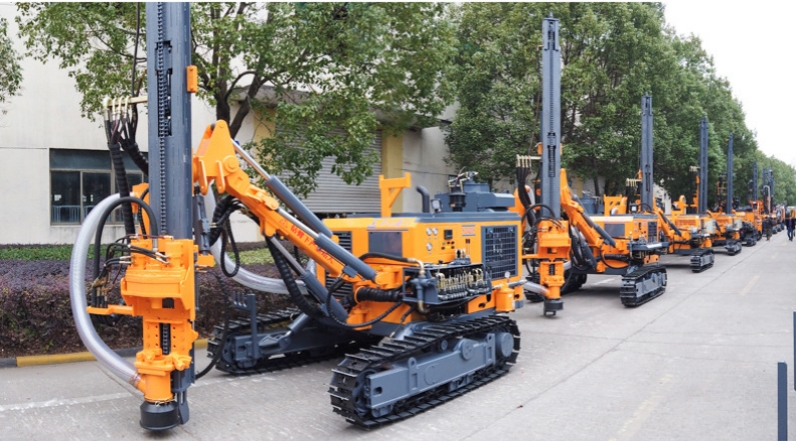In the dynamic world of drilling technology, DTH (Down The Hole) drilling is gaining significant attention for its efficiency and effectiveness, particularly in industries like mining, construction, and geotechnical work. This technique, which utilizes a hammer and bit to drill directly into the ground, has become a game-changer, helping companies achieve deeper, faster, and more precise drilling results. Here’s a deeper look at what DTH drilling is, why it’s so important, and how it is transforming industries worldwide.
What is DTH Drilling?
DTH (Down The Hole) drilling refers to a drilling method where the hammer and bit are located at the end of the drill string, or “down the hole,” directly at the drill bit. Unlike conventional rotary drilling, where the drill bit is rotated by a surface motor, DTH drilling utilizes a powerful pneumatic hammer that strikes the rock surface with great force, breaking it into small fragments. The resulting debris is then removed by a circulating fluid, often compressed air or water.
This technique is highly effective for drilling hard and abrasive rock formations, where other methods may struggle to maintain speed or precision. DTH drilling is often used in applications such as:
- Mining: For drilling blast holes in mining operations.
- Construction: To create foundations and anchor holes for heavy structures.
- Water Wells: For accessing groundwater in areas with tough geology.
- Geotechnical Investigations: To assess soil and rock formations for construction projects.
Advantages of DTH Drilling
The adoption of DTH drilling has revolutionized various industries due to its numerous advantages over traditional drilling methods:
1. Increased Drilling Speed and Efficiency
- DTH drilling is known for its speed. The hammer action delivers powerful, repeated blows to break the rock, making the process faster compared to rotary drilling methods. The impact of each blow is extremely effective, allowing for quicker penetration into even the hardest rock formations.
2. Superior Hole Quality
- DTH drilling produces smoother, more accurate holes compared to other drilling techniques. The precision offered by DTH ensures that the hole’s diameter is consistent, which is crucial for operations like mining or foundation drilling where exact measurements are critical.
3. Better Performance in Hard Rock
- One of the standout features of DTH drilling is its performance in hard and abrasive rock formations. The direct hammering action allows DTH rigs to drill through tough surfaces much more effectively than rotary drilling, where the drill bit can wear down quickly in hard rock conditions.
4. Reduced Fuel and Maintenance Costs
- DTH rigs are generally more fuel-efficient than other drilling machines, leading to cost savings over time. The simple yet effective mechanism of DTH rigs also means they require less maintenance, reducing downtime and repair costs, which is a critical consideration for large-scale operations.
5. Minimal Vibration and Noise
- Unlike other drilling techniques, DTH drilling generates less vibration and noise, which makes it ideal for urban or sensitive environments where noise control is important. This also reduces the impact on surrounding infrastructure.
DTH Drilling in Mining and Construction
In the mining industry, DTH drilling is essential for creating blast holes. These holes, which are used for explosives to fragment rock, need to be drilled deep and with high precision. DTH’s ability to maintain consistent hole diameter and depth even in hard rock makes it the preferred choice for mining operations worldwide.
In the construction industry, DTH drilling is used to create foundations, anchor holes, and other structural applications. The reliability and efficiency of DTH drills ensure that construction projects can move forward without delays, especially in regions where the ground is challenging to penetrate.
Additionally, DTH drilling is increasingly being used in geotechnical drilling. As projects get larger and deeper, the need for accurate soil and rock sample extraction becomes even more vital. DTH’s ability to drill precise, deep holes ensures that engineers can gather the necessary data to inform the design and safety of structures.
New Innovations in DTH Drilling Technology
As industries evolve, so does drilling technology. Recent advancements in DTH drilling equipment focus on improving energy efficiency, enhancing precision, and reducing environmental impact.
- Smart Sensors: Modern DTH rigs are being equipped with advanced sensors that monitor drilling conditions in real time. These sensors help operators adjust parameters for optimal performance, reducing wear and tear and enhancing drill bit life.
- Automated Systems: Automation is becoming more prevalent in the drilling industry. With advanced control systems, DTH rigs can now perform complex drilling tasks with minimal human intervention, improving safety and operational efficiency.
- Eco-friendly Innovations: Manufacturers are working on making DTH rigs more eco-friendly by reducing fuel consumption and emissions. There are also advancements in using biodegradable drilling fluids to minimize environmental impact.
The Future of DTH Drilling
As industries such as mining, construction, and geotechnical exploration continue to grow, the demand for efficient, cost-effective, and precise drilling methods will rise. DTH drilling is poised to play a crucial role in meeting these needs, with innovations in drilling technology helping to make the process even more efficient and sustainable.
With its growing popularity and proven advantages, DTH drilling is set to remain at the forefront of drilling techniques for years to come, helping industries dig deeper, faster, and more efficiently.
DTH drilling has emerged as a cutting-edge technology that is transforming the way industries approach drilling tasks. Its ability to handle tough rock formations with speed and precision, combined with cost savings and reduced maintenance, makes it the preferred choice for mining, construction, and geotechnical work. As advancements in technology continue, DTH drilling is expected to evolve even further, offering even greater efficiency and sustainability for the industries that rely on it.
For companies looking to enhance their drilling capabilities, investing in DTH drilling technology is a step towards improving productivity, cutting costs, and staying competitive in an increasingly demanding market.
Post time: Dec-31-2024




